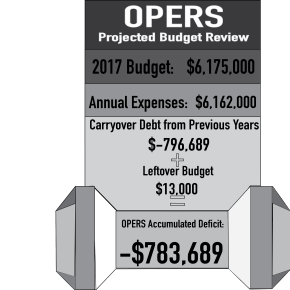
Last quarter, the Office of Physical Education, Recreation and Sports (OPERS) at UC Santa Cruz eliminated the positions of athletic director and head of maintenance in response to a projected deficit of $600,000.
Other vacant positions were left unfilled to further reduce costs, including associate athletic director and marketing, sponsorship and event coordinator. The duties of those positions have been folded into others, in most cases without a raise.
OPERS executive director Andrea Willer attributed the deficit to rising salaries, benefits and maintenance costs in conjunction with stagnated funding from the university. In past years, campus policy has mandated that employees receive a three percent increase in pay, but OPERS’ funds have been relatively unchanged since Measure 32 passed in 2007.
OPERS administration decided to consolidate positions because across-the-board cuts in salary were determined to be an ineffective choice, though the option was discussed and used in the past.
“The question of reducing salaries is a tricky one,” Willer said, “and with staff morale already being low, people already feeling like they’re underpaid and[…] I don’t want to say overworked, but wearing multiple hats. It just didn’t seem like a viable option across the board.”
Former assistant athletic director for event management Marcus Wirth resigned from OPERS to take a position at University of Colorado Boulder as assistant director of building services and risk management. Wirth said the environment described by Willer contributed to his decision to pursue other opportunities.
“I really didn’t have an opportunity to move up at UC Santa Cruz,” Wirth said, “and with the budget situation […] I didn’t really think [staying] was a viable option.”
Wirth also said the cost of living in Santa Cruz was prohibitively high for what he and others were making at OPERS, a sentiment shared by Willer.
“Many of our staff have been here 20 years and are below the midpoint for their range, because traditionally OPERS hasn’t given a lot of increases above and beyond what’s mandated by the campus,” Willer said. “Our fitness instructors are making significantly less than they would if they worked for 24 Hour Fitness.”
According to UC’s annual wage data from the 2015-2016 academic year, many of the OPERS staff earn between $30,000 to $40,000 per year, with some instructors and coaches earning less. Eleven employees earn between $50,000 to $70,000, while Willer earns over $133,000.
Meanwhile, the age of OPERS’ facilities can lead to unexpected and urgent repair needs, such as leaks in the West Gym during rainy weather or when a pipe burst in lower field last year. Currently the swimming pool’s filtration system is not up to code due to public health and safety issues. The filter replacement is estimated to cost $2 million, an amount nearly equivalent to OPERS annual salaries and expenses budget.
OPERS and its various programs and facilities offer some of the only places for students to go to use the gym or play recreational sports.
“Any sort of athletic opportunities […] are through OPERS,” including NCAA, intramural sports, club sports, physical education and recreational sports, said assistant track and field coach David Klech.
In the wake of budgetary trimming, OPERS is projected to save about $300,000 in salary costs. With Measure 64 and 65, OPERS will receive additional funding of about $1.6 million per year. These fees will begin to be collected during fall quarter 2017, less than a month before the end of the fiscal year.
The funds from these measures would go toward funding the replacement of the thirty-year-old pool filtration system. Afterward, Willer hopes to direct revenue toward the deficit, pending approval from the Student Fee Advisory Committee as well as the Vice Chancellor of Business and Administrative Services Sarah Latham.
OPERS is not projected to finish the 2017 fiscal year in a deficit, Willer said in an email, but is projected to have a “negative carry forward,” or an accumulated deficit, of nearly $800,000.

